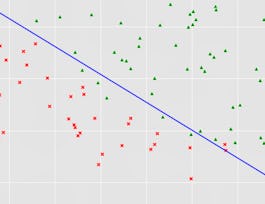Internet of things (IoT) has become a significant component of urban life, giving rise to “smart cities.” These smart cities aim to transform present-day urban conglomerates into citizen-friendly and environmentally sustainable living spaces. The digital infrastructure of smart cities generates a huge amount of data that could help us better understand operations and other significant aspects of city life.


Recommended experience
What you'll learn
Describe types of smart city-generated datasets, data mining techniques, and how to implement them using Python 3.
Explain how to read and preprocess data for data mining.
Apply data mining techniques to smart city-generated data and visualize and interpret the physical implications of the results.
Skills you'll gain
- Statistical Machine Learning
- Machine Learning
- Anomaly Detection
- Markov Model
- Machine Learning Methods
- Data Science
- Statistical Modeling
- Data Analysis
- Unsupervised Learning
- Python Programming
- Predictive Analytics
- Artificial Intelligence and Machine Learning (AI/ML)
- Machine Learning Algorithms
- Advanced Analytics
- Jupyter
- Applied Machine Learning
- Analytics
- Predictive Modeling
- Data Mining
- Supervised Learning
Details to know

Add to your LinkedIn profile
12 assignments
See how employees at top companies are mastering in-demand skills


Earn a career certificate
Add this credential to your LinkedIn profile, resume, or CV
Share it on social media and in your performance review

There are 8 modules in this course
This module provides an overview of the course content and structure. In this module, you will learn about the different course elements. In this module, you will get acquainted with your instructor and get an opportunity to introduce yourself and interact with your peers.
What's included
2 videos1 reading1 discussion prompt
In this module, you will learn about data mining, why we need it, and the approach. The module also presents the basics of probability and statistics, which form the foundation for data mining. You will also gain insight into data preprocessing and data mining task identification.
What's included
12 videos4 readings2 assignments1 discussion prompt
In this module, you will learn about Python programming for data mining. The module also discusses important Python modules: NumPy , SciPy, and Matplotlib. You will learn to install Python using Anaconda and use the Jupyter notebook to write your code. The module also presents some examples demonstrating data preprocessing using Python.
What's included
6 videos4 readings2 assignments3 ungraded labs
In this module, you will learn about supervised learning (learning from examples). The module discusses two supervised learning tasks: regression and classification. You will also gain insights into several classification algorithms such as Bayesian classifiers, decision trees, support vector machines (SVM), and ensemble classifiers.
What's included
12 videos5 readings2 assignments1 discussion prompt9 ungraded labs
In this module, you will learn about unsupervised learning (learning from unlabelled data without any ground truth labels). The module also discusses frequent itemset mining. You will also gain an insight into several data clustering algorithms such as distribution-based, partitional, and hierarchical clustering.
What's included
11 videos5 readings2 assignments1 discussion prompt7 ungraded labs
In this module, you will learn about anomaly detection problems and algorithms. You will gain insight into anomaly detection techniques. You will learn to validate your results. When applying data mining to smart city data, you will also learn to avoid false discoveries using statistical significance testing and hypothesis testing.
What's included
5 videos2 readings2 assignments4 ungraded labs
In this module, you will learn about some advanced data mining algorithms such as artificial neural networks (ANN) and deep learning. You will develop an understanding of the applications of these algorithms. The module also analyzes hidden Markov models (HMMs) for modeling time series (sequential) data.
What's included
10 videos3 readings1 assignment1 discussion prompt4 ungraded labs
In this module, you are provided with your term-end project, instructions to complete the project, and the criteria for how your instructor will grade your submission.
What's included
1 video2 readings1 assignment1 ungraded lab1 plugin
Instructor

Offered by
Why people choose Coursera for their career




Recommended if you're interested in Data Science

Coursera Project Network

Duke University

Open new doors with Coursera Plus
Unlimited access to 10,000+ world-class courses, hands-on projects, and job-ready certificate programs - all included in your subscription
Advance your career with an online degree
Earn a degree from world-class universities - 100% online
Join over 3,400 global companies that choose Coursera for Business
Upskill your employees to excel in the digital economy


